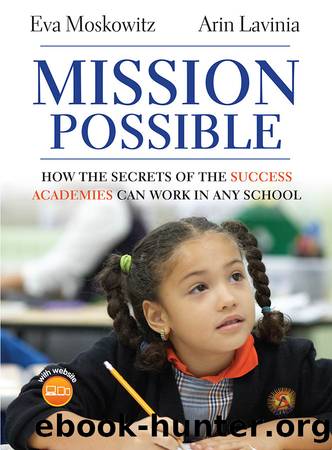Mission Possible, Enhanced Edition by Eva Moskowitz & Arin Lavinia

Author:Eva Moskowitz & Arin Lavinia
Language: eng
Format: epub
Publisher: Wiley
Published: 2011-11-18T00:00:00+00:00
Schooled Not To Be Rigorous
Why is it so hard for even the most talented teachers to be truly rigorous?
Chances are they've been schooled not to make instruction too difficult lest they discourage children and their frail, tender egos. Many of our teachers taught previously in schools with low expectations and dismal results. They may have been the exceptions to the rule at their old school, and they naturally assume they brought high expectations with them to Success Academies.
The problem is they don't actually know where the bar should be. In college and graduate school they were steeped in educational literature that spends so much time warning against doing anything that might not be âdevelopmentally appropriateâ that it seems almost a crime to aim above kids' heads. Our vantage point, however, is different. We think it's a shame and maybe even a crime to bore kids to tears and to underestimate their ability to think and reason. In our experience, kids are unbelievably clever and profound when given the opportunity to be so.
Many young teachers do not have children of their own, and perhaps that is why they are so uncertain about where the bar should be. In the absence of personal knowledge, they defer to those whom they perceive to be the experts. Also, there is such a consensus about what is âage appropriateâ that it is hard to find people to argue with, and therefore teachers' views often do not evolve.
Unfortunatelyâtragicallyâthe bar in most American schools is set perilously low. There is a race to the lowest common denominator such that the children in the class who struggle most establish the level of rigor. It's a sad truth that many kids who graduate from our high schools need remedial math and reading before they can start taking regular college classes. But this happens in elementary and middle schools as well. All too often this need for remediation determines where the bar is set. Publishers are selling textbooks to dysfunctional districts and literally are assuming (perhaps often correctly) that the kids in first grade have to repeat most of kindergarten math because they did not learn it the first time. Publishers imagine it takes a gigantic amount of time to teach something like fractions. The rigor bar suffers from prevailing ideas about not only what kids should learn but also how long it will take them to do so. It is as if no empirical evidence about how fast children can learn actually dictates the content or pace of learning.
Through no fault of their own, teachers, in schools of education and via curricular materialsâthe textbooks and resource materials created to teach reading, writing, and mathematicsâhave almost been conditioned to treat remedial instruction as the normal state of affairs in public education. Prior teaching experience in dysfunctional schools has reinforced that message. Finally, teachers are taught that they are successful when everyone gets it. If you keep the bar low, everyone will get it, ergo ⦠you've got the American public school system.
Download
This site does not store any files on its server. We only index and link to content provided by other sites. Please contact the content providers to delete copyright contents if any and email us, we'll remove relevant links or contents immediately.
The Art of Coaching Workbook by Elena Aguilar(51136)
Trainspotting by Irvine Welsh(21608)
Twilight of the Idols With the Antichrist and Ecce Homo by Friedrich Nietzsche(18600)
Fangirl by Rainbow Rowell(9211)
Periodization Training for Sports by Tudor Bompa(8236)
Change Your Questions, Change Your Life by Marilee Adams(7717)
This Is How You Lose Her by Junot Diaz(6856)
Asking the Right Questions: A Guide to Critical Thinking by M. Neil Browne & Stuart M. Keeley(5740)
Grit by Angela Duckworth(5576)
Red Sparrow by Jason Matthews(5449)
Paper Towns by Green John(5163)
Room 212 by Kate Stewart(5090)
Ken Follett - World without end by Ken Follett(4705)
Housekeeping by Marilynne Robinson(4420)
The Sports Rules Book by Human Kinetics(4367)
Double Down (Diary of a Wimpy Kid Book 11) by Jeff Kinney(4252)
Papillon (English) by Henri Charrière(4238)
The Motorcycle Diaries by Ernesto Che Guevara(4069)
Exercise Technique Manual for Resistance Training by National Strength & Conditioning Association(4048)
